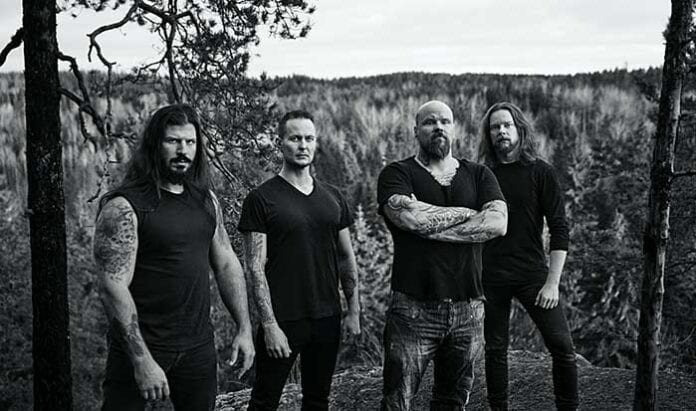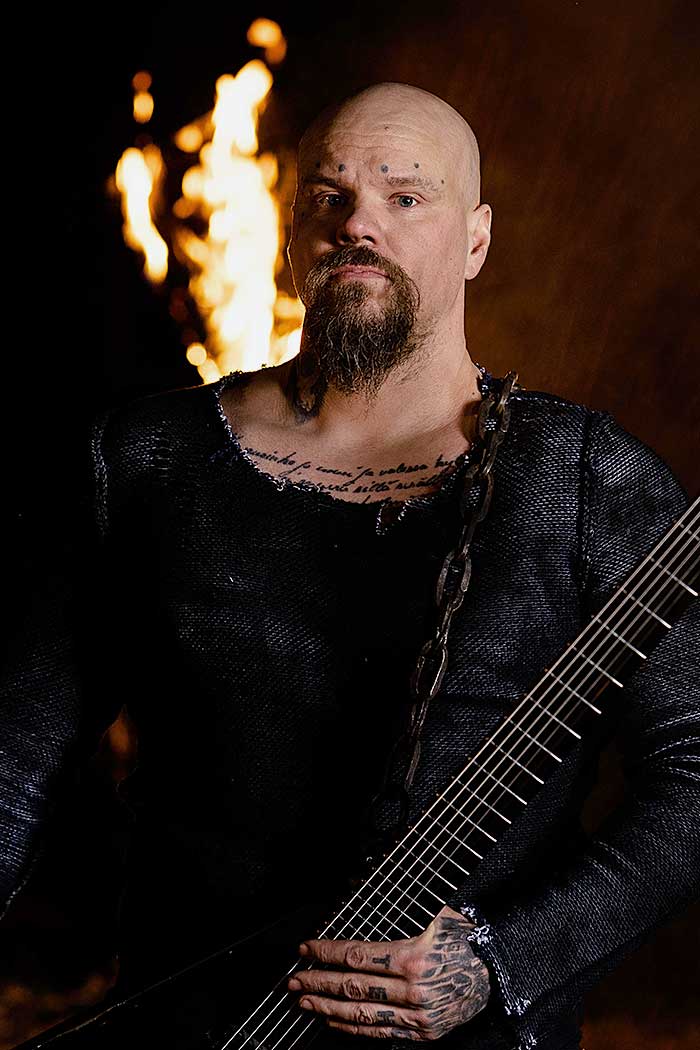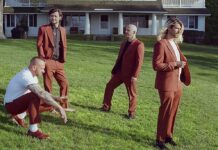
INTERVIEW WITH TUOMAS SAUKKONEN BY JOE DALY
BAND PHOTOGRAPH BY VALTTERI HIRVONEN
TUOMAS SAUKKONEN PHOTOGRAPH BY HANNU TIAINEN
In 1939, thoroughly freaked out by the gathering storm in Nazi Germany, Soviet leader Joseph Stalin demanded that neighboring Finland cede to Russia approximately 16 miles of territory along the Karelian border. Russia’s justification was that it needed the land to properly position itself against an attack from Germany. The Finns told Stalin to get fucked, and Russia responded by sending a half million troops to invade at the Karelian border. On paper, the Finns had no chance.
Despite all odds however, the Finnish army held off the Russians for three bitter, frostbitten months, waging a ferocious guerilla offensive against the Soviets across snowy woods and frozen tundras. Although they eventually agreed to peace and ceded 11 percent of its territory to Russia, Finland had decimated the larger and better armed Soviets. While the Finns sustained 65,000 casualties, the Russians suffered over 300,000, and the war was regarded as an embarrassment to Russia and a rallying point for Finland.
It is this bloody slice of history that inspired Wolfheart’s latest release, Wolves of Karelia (Napalm Records), and their fifth album sees the Finnish quartet notch exhilarating new heights with a blazing clutch of melo-death bangers that deliver equal parts ferocity and deep, heartfelt emotion. Their US tour with Rotting Christ and Borknagar, scheduled for this spring, was sadly derailed by the pandemic, although the band recorded a live set in early April, professionally mixed and recorded in HD, which they are releasing as a download on April 9.
We caught up with guitarist/vocalist Tuomas Saukkonen to discuss the new album, the effects of the pandemic, and how fans can support bands during these exceedingly difficult times.
So how are you holding up?
That’s become a bit of an interesting question lately (laughs). The world seems to be in a very complicated situation.
And a frustrating one for bands and fans. Your tour was canceled before it began.
A lot of plans got changed very quickly when this pandemic started to go down.
How did the band respond when these cancellations began?
We were lucky about many things. We were lucky that we hadn’t flown to North America yet when the whole thing started. The tour got canceled about five days before we were scheduled to fly into San Francisco, so it was a bit easier doing the damage control from home—trying to get the money back from the flights and reorganizing everything. A lot of European bands, including some Finnish bands, weren’t so lucky. Out on the road in North America or Europe, things get a lot more complicated when you’re thousands of kilometers from home and you’re trying to figure things out. So, it helped us a bit to be able to start rearranging things from home. Finland is in pretty good shape at the moment, still. We’re okay. Of course, in other countries, the financial damage is going to be a lot bigger than the virus is ever going to get. All the members of the band that had jobs were able to go back and work, so if I could use the word “normal,” I think we’d be quite close.
“THERE’S CLEARLY GOING TO BE SOME DAMAGE TO THE ALBUM’S RELEASE. IT’S IMPOSSIBLE TO FIX BECAUSE THE WHOLE WORLD IS IN SHUTDOWN MODE.”
What sort of fallout are you experiencing, especially with a new album dropping and other support commitments in flux?
We don’t even know. A lot of people at the label and in our management are running through different scenarios and trying to see. The biggest damage was not the tour getting canceled, because that’s been rescheduled for next year. You can always recover if one tour gets canceled. I’m pretty sure that festival season is going to be canceled, too, so the biggest hit for me at the moment is that the album is coming out on April 10 and there’s nothing on the calendar—no shows and no festivals. A lot of the big markets and stores are closing the doors. Nobody’s going out and buying things at the moment, so there’s clearly going to be some damage to the album’s release. It’s impossible to fix because the whole world is in shutdown mode. I think that in September or October, we’ll have a better understanding of how much the album’s release was affected. In the worse case scenario, there could be some long-term effects. If we’re not able to generate enough money for the label, it might be an issue for the budget of the next album or the videos or the tour support. So, that’s what I’m more concerned about—not as much about the tour getting canceled as how this is going to affect our sixth album in 2021.

Wolfheart was one of the first bands to offer a live set to fans. What did that involve?
Yes, we’re the only band I’ve seen so far that’s not doing a live stream. We chose a different way. We’ve shot the gig already, and I’m now in the middle of the editing. When the gig is released on April 9, all of the people who bought a ticket to the show will receive a download link. They’ll be able to download the full HD quality gig with eight cameras and audio mixed in the studio. It’s like a DVD that you can watch on your phone or tablet or TV as much as you want. My issue with the streaming is that now with everybody on the internet. YouTube and Netflix have announced that they’re going to lower the quality because of the overcrowding. And we have fans in every time zone, so scheduling would have been very difficult. To me personally, a bigger issue is that, because I’ve been doing music videos for the past 15 years, I can’t handle if the changes of the camera angles don’t follow the tempo of the song. With metal bands it gets tricky, because there’s a lot of fast tempo songs. There are really important decisions involving which camera changes to which and when, so it actually looks good. It’s a lot more work for us this way. It will take at least 70 hours for me to edit the gig. With eight cameras, there’s a lot of footage to go through. But we want to ensure that the quality that we give our audience is the very best we can offer because they’re missing the same thing that we’re missing—there’s no energy that you get in the actual live experience seeing a band in the flesh, so it created a bit more pressure to make the production for the live set as good as it could be.
“IT’S BEEN THE MOST EXCITING ALBUM WRITING AND RECORDING PROCESS. THE LONGER YOU WAIT TO DO SOMETHING YOU LIKE, THE MORE YOU’RE GOING TO ENJOY IT.”
What was your mindset as you approached the songwriting process for Wolves of Karelia?
This time I took a completely different approach to the songwriting. After the previous album, Constellation of the Black Light, we played 140 shows in 10 months, which is clearly too much. We were constantly flying somewhere, touring somewhere, and I was home for less than a month that whole time. And I don’t write music on tour. I need to be in my home with plenty of silence and privacy. So, this was the first time in 10 years that I didn’t write any riffs for Wolfheart in such a long period. So, when the last tour finished last August, I was counting days when it would be over, not because I wasn’t enjoying the tour, but because I was looking forward to getting home and writing new songs. I hadn’t been that excited to write and record music for at least 10 years. So, I ended up writing the whole album in less than one and a half months. It’s been the most exciting album writing and recording process. The longer you wait to do something you like, the more you’re going to enjoy it.
The Winter War is the album’s underlying theme, and last month marked the 80th anniversary of the end of that war. What does that mean to you as a Finn?
I don’t think it means the same to every Finn, at least nowadays anymore. But to me it’s a huge thing. I’m very familiar with that era of Finnish history, and I’ve been interested in it since I was a kid. I was born in the Karelian region, where one of the biggest and most important battles was fought. My father’s family has a farm that they’ve had for a couple of hundred years that’s only seven kilometers from the border. And in the village where I was born, there are still canons pointing toward Russia and some of the buildings have that old Russian architecture, so these raised a lot of questions for me when I was a kid. To me, it does mean a lot, but I didn’t want to overstate the war theme. That’s why there’s nothing like that on the cover and also the album title is pretty neutral. There’s already Sabaton from Sweden. They can document every battle, war, and warrior since the dawn of mankind, that’s their thing. My approach was not to push the war theme too strongly, but to have it present in all of the lyrics on the album.
What’s the inspiration for “Horizon on Fire?”
The first two songs [“Hail of Steel” and “Horizon on Fire”], follow the same theme—both occur at the beginning of the war. That song is from the civilian point of view, rather than the soldiers in the war. I was reading a lot of interviews with veterans, so all of the lyrics have more of an individual point of view instead of a historical one. Finland is a small country and a very humble country. We don’t have a history of war or conquerors. But Russia does, with men like Alexander the Great and many others in the past. We have an army that’s not a professional army. Everybody attends the army [compulsory service], but the concept of war for the Finnish people was completely different. We were not prepared for that kind of thing to happen—an army that literally set our horizon on fire. That was such a huge thing for people to experience because it came from such a different world, so to speak.
With such an easy songwriting process, did you encounter any real challenges in the recording?
It was a pretty easy album to record. It was probably more chaotic and a little bit frustrating for the other members of the band, though. Being so excited about getting back to writing and recording, I kind of skipped the pre-production phase, which meant that the other members first heard a lot of new ideas right there in the studio. Apparently, they wanted more preparation and time to practice their parts (laughs), and they gave me feedback that they’d rather have days than hours to prepare the recordings. Then again, as good as they are, that issue didn’t affect the quality of the album. And it wasn’t a challenge to me, obviously. But it was a super easy album to do.
“GREAT MUSIC COMES FROM A PLACE OF SPONTANEITY, WHERE THE LESS YOU THINK ABOUT YOUR ART, THE BETTER IT’S GOING TO BE.”
You’ve recorded upwards of 20 albums with a number of bands. What are the elements of a great song to you?
That goes completely backwards for me. The more that I write, the less I think about it and analyze it and the less I’m able to explain. I think that great music comes from a place of spontaneity, where the less you think about your art, the better it’s going to be. It doesn’t matter if it’s a poem, a painting, or a song, the prime audience is yourself and the more that you write, paint, or whatever for yourself, the better and more consistent the results are going to be. There’s no formula, where a song has to have a certain beginning or end. The less analyzing, the better. I do these songwriting workshops on and off, and the first thing that I try to explain to young songwriters is less thinking and more hearing. Otherwise, you’ll be stuck thinking this part needs to be faster or slower, or some people might want heavier guitars, and the reality is that you’re never going to be able to please everyone.
Was there a point during the production when you felt like you’d achieved something significant?
Okay, now I do remember, there was a huge setback in the recording and overcoming it was a high point for me. I don’t know why I didn’t remember that when you asked about the challenges. I’ve been having these weird back issues for two years due to my bench press routine. There’s a lot of extra pressure around the spine and upper back that causes a lot of tension and headaches. It also started cramping my core muscles, which didn’t affect my regular life, but it did start to affect my growl, because I couldn’t get enough air out. I was losing the distortion in the sound and I was starting to sound like a bad hardcore vocalist. I was just shouting and not getting the growling sound out. So, that was a huge struggle in the studio. We had this one deadline set where we needed to get something recorded by a certain day or we would have been fucked. The day before that I found this one specialist who happened to be a metal fan who had actually seen us play a few times and so he knew exactly what to do to fix the cramps, just for the recordings. Because of that, the vocals sound, at least to my ears, like the best I’ve done so far. So, I’m exceptionally happy about how the vocals came out because they were almost completely fucked up.
“THE VETERANS OF THE FINNISH ARMY IN THAT WAR, THEY WERE THE WOLVES OF KARELIA. IF THEY WERE THE WOLVES, THEN OUR GENERATION, ON THE BEST DAY, ARE TEDDY BEARS.”
Outside of Finland, not many are familiar with the concept of “Sisu,” which sounds like a way of summoning inner strength or guidance. Is that right, and what does that idea mean to you?
It does mean more to a Finnish person than a translation could ever explain. It has this connection with the Winter War and the mentality of existing among very extreme conditions. It became this legendary Finnish attitude that’s based on the ideas of perseverance and the will of mind. Since what happened in the Winter War was so remarkable, it’s such a strong word, and I don’t see it happening in our generation anymore. If you’re about to use that term, something great needs to happen. It’s not some average thing. It’s a very strong Finnish concept, and our generation doesn’t really have the backbone to use it anymore. We don’t deserve to use it, let’s put it that way. That’s where the album title comes from—the veterans of the Finnish army in that war, they were the Wolves of Karelia. If they were the wolves, then our generation, on the best day, are teddy bears. We don’t get to use that word anymore, but those guys earned the term of Sisu.
Although we can’t predict how this pandemic might play out, do you have a message to the metal community as to how we can support the bands and each other during this time?
I’m going to take a more global approach. The bands are going to survive, and, of course, and the music always survives. That will never disappear. My biggest worry is for the music industry itself—the venues, record stores, the bars, the agencies, the tour bus companies, t-shirt printing companies, etc. There’s not much that they can do because the issue is so big, it’s a global economic crisis. So, I think that now is the best time ever for the stronger to help the weak ones in every possible way. Bands will survive and venues will be rebuilt, but there’s a lot of people just in your close circles that might need help. Things are growing bigger day-by-day with this surreal science fiction movie that we’re all living in, so I’d just ask everybody to take good care of everybody.




















